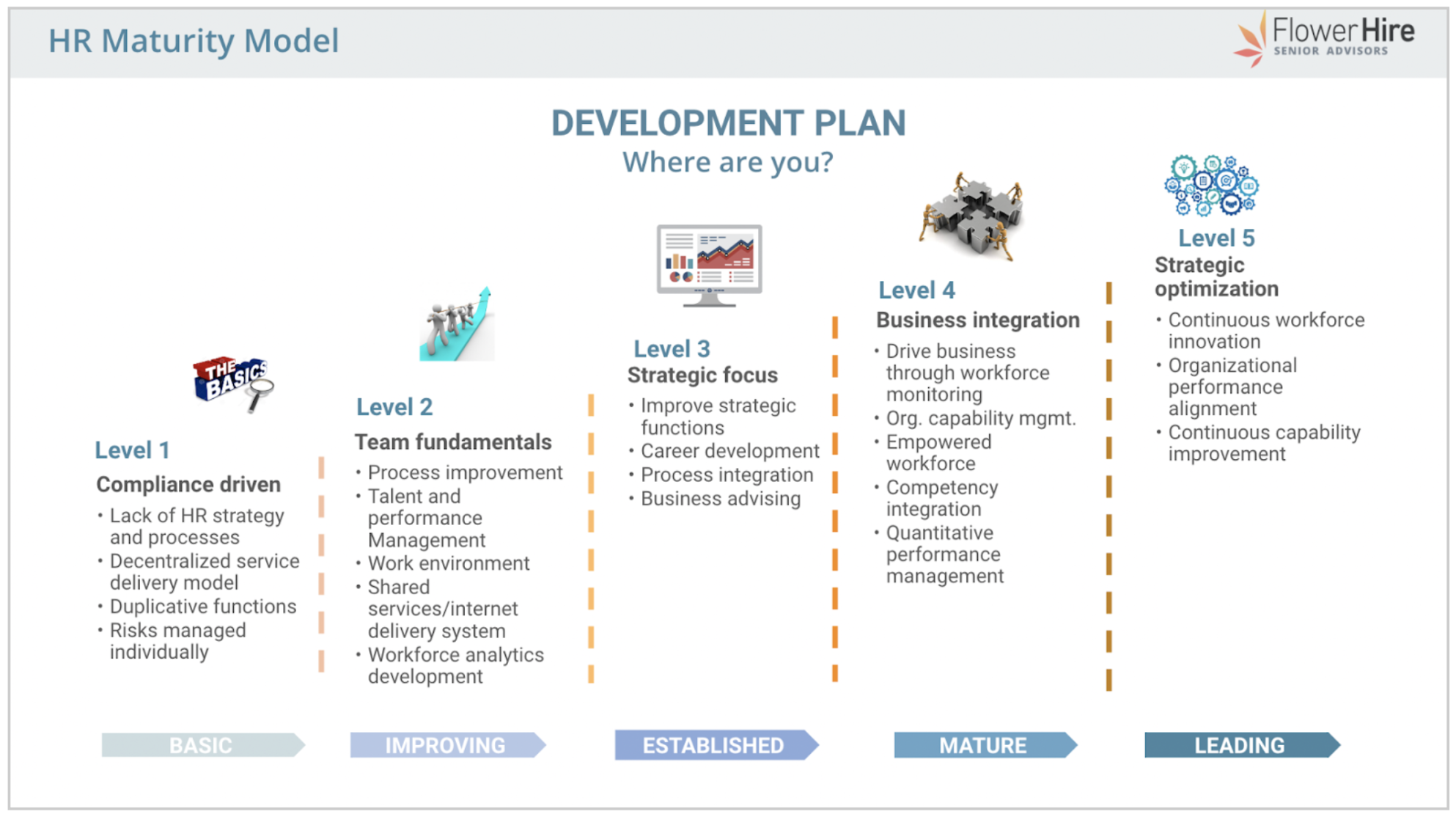The economy is struggling and the cannabis industry is taking a fair amount of hits. It’s common in down markets for companies to be reactive, and to resort to layoffs and other “austerity measures”. But ultimately, cutting corners with people is a short sighted strategy that can result in lasting, negative repercussions.
Successful companies will take the time to drill down and invest time and resources into a human capital strategy that will serve them as they mature from startup to a more established company. Enter the HR Maturity Model. The HR Maturity Model leads to innovation and stability. The model provides some simple, practical ways to guide HR leaders in cannabis through this downturn, and help them differentiate themselves from the competition.
What is The HR Maturity Model in Cannabis?
The cannabis business landscape is highly competitive, dynamic, and always evolving. The HR Maturity Model provides a set of tools to cannabis operators to help them assess how successful they are when it comes to managing their talent. Consider it like a grading system that scores companies based on how well they are utilizing their human capital. Specifically, it measures the rate at which companies are maturing through continuously testing, growing and improving processes that positively impact their workforce and overall culture. For leadership, the model provides a roadmap of where companies are today and where they want to be in the future.

At one end of the spectrum are companies with basic “transactional” HR processes. Payroll, compliance, and benefits enrollment are the full extent of what the HR teams provide. We’ve all worked at those companies where the employees feel like they are just a number and where they don’t feel appreciated or valued. This paradigm represents an impersonal way to manage talent, and fosters a culture of high turnover.
On the other end of the spectrum are companies with “transformational” HR processes. In these environments, employees feel like they have a voice and a space where their ideas can be shared freely. This fosters a culture of harmony, innovation, and ultimately, financial success.
Because we are a new industry, we have the opportunity to start on the right side of the spectrum. But how do we achieve this? How do we evolve our companies from where we are “transactional”, to where we want to be “transformational”?
The mistakes that have been made in other industries are not inevitable here. Let’s not let history repeat itself. We’re still young, and there is still time to build this space, to quote the late and great Steve Jobs, “to put a ding in the universe. “
The Importance of A Human Capital Strategy
Human capital is a company’s greatest competitive advantage, full stop. Companies who have great people are admired, but it takes effort; they hunt for their talent, not fish. The way to hunt is to show off like a peacock. The “display” includes all the attributes a company can offer that illustrate it’s not just a job, it’s a lifestyle.
Often companies don’t know where to start; the maturity model starts with an audit that helps companies understand where they are today and where they want to go. Cannabis leaders may think of the industry as being a very attractive place to work, but the reality is that our companies have much work to do to become places where professionals will want to build a career. The stigma of the industry as erratic, “The Wild West,” and its past associations with criminality do not help.
One of the factors companies should examine first is compensation. One of the top reasons talent leaves an organization is if their compensation is not competitive against their peers. So the model will assess: Does that company have a competitive compensation strategy that lures new talent and retains current talent? Are they driving the right behaviors with their compensation strategy and gaining the most from their employee base? What is the company’s total compensation philosophy?
And hiring the best talent is no longer enough– once they’re there, retention is the goal. That only happens through career development and training. The maturity model helps identify the best talent and provides guidance to help nurture them for the long term. You may be good at attracting folks to that first budtender job, but how many of them are sticking around and rising through the ranks to become a VP of Retail? And what are the tangible programs to implement to help increase the odds of that happening?
Do you know where your organization lies on the HR Maturity Model? An audit is the first step in the process. Learn what your gaps are and prioritize human capital strategy to create a road map to success. Send me an email to connect and learn more: Jason@flowerhire.com.

About Jason Desentz
Jason is a human resource strategic leader with over 20+ years of progressive human resources experience working for start-up cannabis companies and Fortune 100 companies such as Gage Cannabis, Skymint Brands Cannabis, Ford Motor Co., Chrysler, Goodyear, and more.
He has holistic experience in every area of human resources administration such as training and development, talent management, compensation & benefits, employee relations, union negotiations, leadership and executive coaching and more. Over his career, Jason has continued to explore ways that data can be used to enhance the HR experience for organizations.


